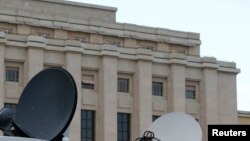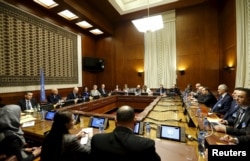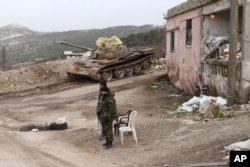Members of Syria's main opposition group arrived in Geneva Saturday, but it is not clear whether the Saudi-backed High Negotiations Committee will participate directly in U.N.-backed talks on a political settlement of the Syrian civil war.
Despite the absence of the opposition delegation, U.N. officials opened the talks Friday in Geneva the first international effort for a peace settlement since earlier U.N. negotiations collapsed in 2014.
Talks began with a meeting between the U.N. special envoy to Syria, Staffan de Mistura, and a Syrian government delegation headed by the country's U.N. ambassador, Bashar Jaafari.
De Mistura said afterwards he hopes to meet with opposition representatives on Sunday.
"I have good reasons to believe that they are actually considering this very seriously, and therefore to be in a position on, probably, Sunday, to actually start the discussion with them, in order to be able to proceed with the intra-Syrian talks," de Mistura said.
The HNC said earlier it would boycott the negotiations completely because Russia and the Syrian government have not halted airstrikes on civilian areas, or eased blockades that have stopped deliveries of humanitarian aid.
On Friday, however, the opposition coalition said it had received unspecified "assurances" that prompted the HNC's decision to send a delegation to Geneva after all.
U.S. Secretary of State John Kerry said in a statement, "The United States welcomes the important decision by the High Negotiations Committee of the Syrian opposition to attend negotiations."
Kurds leave Geneva
Representatives of Syrian Kurds fighting against the Syrian government said they were not invited to join the Geneva meetings, and will not be part of the peace talks. Turkey opposed the Syrian Kurds' participation, contending they are linked to the Kurdish fighters who have fought with Turkey for 30 years over control of Kurdish-majority areas of southeastern Turkey.
The civil war in Syria has dragged on for nearly five years, killed a quarter of a million people and displaced millions more. The conflict has also seen the birth of the Islamic State militant group and triggered a massive wave of refugees to western Europe.
The battles in Syria have intensified since September when Russia began air strikes in support of President Bashar al-Assad, countering the efforts of opposition groups supported by the United States, some members of the European Union, Turkey and Saudi Arabia.
The complicated backdrop makes the peace process especially difficult.
Significant gains for Assad's forces
With Russian support, Assad’s forces have made significant gains. Analysts say the government has little incentive to negotiate with an opposition that is weak and fractured.
Despite the opposition coalition's move toward joining the Geneva talks, analysts are pessimistic. Nadim Shehadi, of the Fletcher School of Law and Diplomacy in Boston, sees little chance of success.
“We are pressuring the opposition to prove that they are united, coherent, that they have a strong leadership and that they have a vision, and a policy and a certain consensus on what the future will be," Shehadi said. "And I don’t think they do, I don’t think they will in the near future, and I don’t think they can.”

















